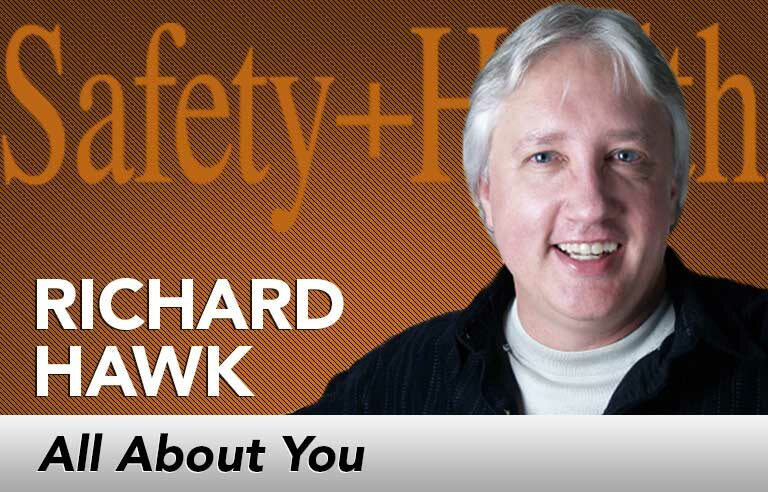All About You: Be an active listener

EDITOR’S NOTE: Motivating employees to work safely is part of the safety professional’s job. But who motivates the motivator? In this monthly column, veteran safety pro and professional speaker Richard Hawk offers his entertaining brand of wisdom to inspire safety pros to perform at their best.
Nobody is a perfect listener. But becoming better at it – that’s something you can shoot for. Improving your listening skills is well worth the effort because active listening makes other people feel good, helps build stronger relationships, increases your influence and even reduces stress.
For safety and health professionals, active listening has an added benefit: We can find out what’s happening “in the field” because people will be more likely to tell us what’s going on if we listen attentively. Tied with practicing mindfulness, no other skill I strive to master has improved the quality of my life more than active listening.
Surprisingly, research shows that most people don’t listen as effectively as they think they do. In the best-selling book, “The 7 Habits of Highly Effective People,” author Stephen R. Covey wrote, “Most people do not listen with the intent to understand; they listen with the intent to reply.”
Part of the problem is that although nearly everyone agrees that listening well is important, most people don’t feel a strong need to improve their own listening skills. However, you and I don’t have to fall into that category. With commitment and a conscious effort, we can continually improve as mindful listeners. Here are tips to get you started:
- Ask family, friends and trusted co-workers what kind of a listener you are. Don’t give excuses if they say you are a poor listener. Just realize you now have something to work on. The fact that you care enough to ask shows you can improve.
- Notice other people and how they listen. You may find that nearly everyone could use some practice at listening.
- Pay attention to yourself while you’re listening, especially while you’re listening to someone who is a slow talker. That’s the time when your poor listening habits will surface the most, because we think so much faster than people talk that we can become impatient and more easily distracted.
Three key habits of a good listener
- Use facial expressions that show you understand the general mood and emotion associated with what the person is saying. If you’re being told something sad, show some sadness on your face. Same thing goes for upbeat things – send signals that you understand the positive theme of the message.
-
Use steady, soft (not piercing) eye contact the entire time you’re listening. You should be able to tell what color the person’s iris is, and even if it does or doesn’t have a darker ring around the main color. However, it’s good to break eye contact every once in a while so you don’t seem intimidating – especially if it’s with someone you don’t know well, such as a contractor on a construction site.
About 20 years ago, I started working on my listening skills, and on one particular day my daughter Amber – who was in her teens – said, “Dad, you’re looking at me weird.” I asked if it bothered her, and she said, “No, I like it. It seems like you’re actually listening to me.” We both laughed, but it made me realize I could have done a better job of listening to her while she was growing up. - Ask further questions. I’ve found this to be the best method for showing that I’m actively listening and am interested in understanding what the other person is telling me. Most times, when someone tells us a story, perhaps about a trip they took or a problem they have at work, we tend to reply by telling them about one of our trips or problems. Instead, ask the person questions about his or her story, which forces you to listen instead of thinking about yourself. (One of the reasons active listening reduces stress is because it gets our mind off of our own lives and worries.)
There are several other things you can do to be an active listener (I’ll be talking about some of those in this month’s podcast), but the three I’ve explained above are my favorite techniques. You and I may never become “perfect” listeners, but I wish us both grand success at becoming better at it!
 Richard Hawk helps companies around the world create more vibrant safety cultures by showing them how to make safety fun. As a professional speaker, author and musician, he also inspires employees to focus better and enlightens safety leaders about ways to increase their influence. To learn more about Richard, visit www.makesafetyfun.com.
Richard Hawk helps companies around the world create more vibrant safety cultures by showing them how to make safety fun. As a professional speaker, author and musician, he also inspires employees to focus better and enlightens safety leaders about ways to increase their influence. To learn more about Richard, visit www.makesafetyfun.com.
Subscribe to the podcast feed in iTunes
Post a comment to this article
Safety+Health welcomes comments that promote respectful dialogue. Please stay on topic. Comments that contain personal attacks, profanity or abusive language – or those aggressively promoting products or services – will be removed. We reserve the right to determine which comments violate our comment policy. (Anonymous comments are welcome; merely skip the “name” field in the comment box. An email address is required but will not be included with your comment.)

